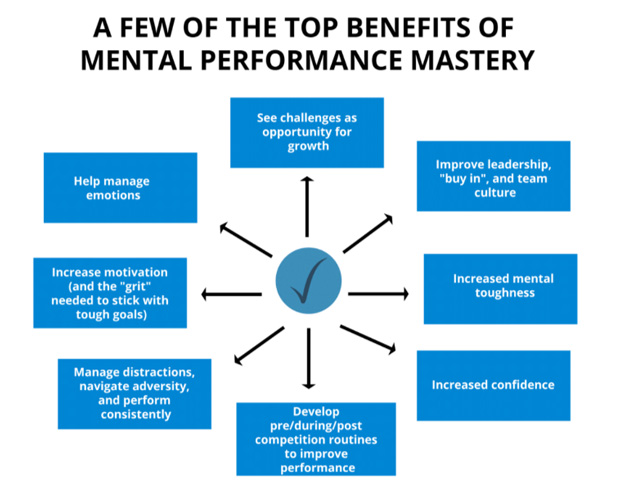|
By: Brian Cain, CMAA As a three-sport standout athlete and captain at Mt. Greylock High School in Williamstown, Massachusetts, I thought I was prepared for success in collegiate athletics. Man was I wrong. I quickly realized the meaning of the phrase, "big fish in a small pond." Graduating high school with a class of just 96 students may have skewed my reality when it came to how good I really was. It was like being the best snowboarder in Mexico if that's an analogy you can relate to. So, when I walked onto the campus of the University of Vermont on a baseball scholarship with high expectations, I was surprised to get low results. To say I failed miserably might be the understatement of the century. But my failure to produce on the field was NOT due to a lack of motivation, effort, or attitude. In fact, my failure was directly attributed to being extremely motivated, giving too much effort, and having a perfectionist attitude. Now, I get why that may sound a bit odd. Crazy even. So, let me explain... A hundred miles per-hour in the wrong direction – are you making this costly mistake? As coaches, we often get tricked into thinking that to get more, you must do more or work harder. That's just not the case, most of the time. If you work hard at the wrong aspects of your sport, have poor technique, or fail to work on your mental game, it's like sprinting south when you want to go north. You're working hard - you're just not headed in the right direction. And doing more of the wrong type of training - focusing on things other than what's TRULY holding back performance will simply take you further away from your destination. Trust me, I LIVED this as a collegiate baseball player. Whether it was running a marathon on the track during the first day of college baseball practice thinking that would help get my legs stronger or lifting weights for two hours every day - I would do whatever it took to be successful. The problem was, I did all the WRONG things. I did them hard, fast, and frequently. That hard work didn't lead to success on the field. It led me to the athletic training room, shoulder surgery, and the end of my baseball career. Had I taken the time to figure out what area of my performance needed improvements the most, and directed all my efforts toward those things, things could have turned out much differently. It's something that haunts me to this day. This is a huge part of why I am so motivated and committed to coaching others in mental performance and did so on a consistent basis when I was the athletic director at Mt. Mansfield High School and North Country Union High School in Vermont before going full time into mental performance coaching in July of 2011. I made the jump because I wanted to help coaches and athletes avoid the mistakes I and thousands of others have made (and will continue to make) on a larger scale. Every day athletes go out and perform well below their true potential. They fall short where they have got it done in practice so many times before. And when this happens, their coaches shake their heads, not knowing what to do. Driven crazy by seeing an athlete who is physically capable be derailed by lack of confidence or mental toughness or focus. This is where mental performance comes in to play (or at least it SHOULD). Is every "gap" in performance related to the mental side of things? No. But by and large, most coaches and athletes are focused disproportionately on the physical side of performance… leaving mental performance up to chance. This is a huge mistake! Mental performance accounts for a good 90% of results (level of performance an athlete can achieve), yet we spend less than 10% of the time focusing on developing this crucial component. Let's change that, and I'm here to help. The 10 mental skills every athlete needs for peak performance (AKA: The 10 Pillars of Mental Performance Mastery) Developing strong mental performance skills is often the differentiating factor between "athletes" and "elite athletes." Between participants and CHAMPIONS. Mental performance is the number one way to separate yourself from the pack as an athlete. To overcome the barriers that are holding athletes back from their TRUE potential. Mental performance isn't just a prescriptive tool used to solve a problem that arises, although it can certainly be used for that. It's also a preventative measure to allow you and everyone you coach to be in the best state of mind - when they need it most.
By learning how to understand and manage your brain, you open the pathway to being able to take a weakness and leverage it into a weapon of strength. That's the true power of mental performance mastery. I've dedicated my career both as a high school athletic director and now as a full-time mental performance coach to helping high school coaches and athletes master the mental game and take their performance to the next level. Here are the 10 mental performance skills every athlete needs for peak performance - and why they matter. Pillar #1: Elite Mindset Without the right mindset, athletes will have doubt about themselves, doubt your coaching, and your team will begin to fall apart. Those you coach will think they "just don't have what it takes" when they fall short due to mental challenges or they'll blame a lack of talent. But by developing the elite mindset in those you work with; you can get them to be responsible for bringing consistent energy to their workouts/practices/games and staying positive when things get hard. You can help them see setbacks - things they used to think of as "failure" - as an opportunity for growth. And that makes a HUGE difference. By teaching your athletes that they can GROW and TRAIN their mindset just like their bodies, they will finally be able to reach their potential. Pillar #2: Motivation and Commitment No one is going to reach big goals or max out their potential without high levels of motivation and commitment. This is something we know. But often, these crucial skills are left up to chance. We just "hope" athletes come to us highly motivated and committed. When adversity comes knocking - as it always does - the level of motivation and commitment one has will largely determine whether they push through and stick with it, or whether they give up. By learning how to coach motivation and commitment, we can help athletes develop the grit needed to stick with it even when things get hard and they don't feel like it. Pillar #3: Focus and awareness The people we coach are not "perfect." They self-sabotage, allow distractions to derail performance, fall victim to negative self-talk, and let one mistake turn into a series of mistakes or bad decisions. We can pretend like that's "out of our wheelhouse." We can try to ignore that these are real obstacles that affect our success as a coach and the success of those we're coaching - but at the end of the day, this is a reality. Those who succeed don't do so because they somehow evade trials and challenges. They succeed because they develop a SKILLSET that allows them to overcome the challenges and trials they face - and focus and awareness is a crucial component of helping them do that. With your help, those you coach CAN display a highly trained level of present moment focus and self-awareness so they can manage distractions, navigate adversity, and perform consistently. Pillar #4: Self-control and discipline We've all seen athletes who, despite incredible talent, fall short of their potential and are unable to withstand the pressures of competition. By learning how to coach the skill of self-control and discipline, you CAN turn things around for those who struggle with this. When you begin to intentionally and consistently train self-control and discipline, you will notice athletes who are better able to:
Pillar #5: Process over outcome As coaches, one of the biggest battles you face is this: getting your athletes to do the day-to-day, mundane tasks necessary to reach their goals, even when they don't feel like it. By coaching the process over outcome skillset, you can redirect focus to what is within OUR inner locus of control - and drive the actions needed to achieve the desired outcome. As those you coach begin to develop this crucial pillar of mental performance mastery, they will become better at executing the day-to-day plan consistently - whether they "feel" like it or not. This allows you to teach an appreciation of focusing on what they can control, letting go of what they can't, and aiming for daily improvement. Pillar #6: Mental imagery and meditation Whether we're aware of it - or not - the mental images we create and carry around (both positive and negative) have a direct impact on physical and mental performance. When you begin to train the skillset of mental imagery and meditation, athletes are better able to stay calm under pressure and focus on the present task, rather than getting caught up in the past or future. They also build the skill of being able to evaluate circumstances and respond to situations logically and rationally, rather than allowing emotion to take over. Pillar #7: Routines and Habits of Excellence After nearly two decades of working with high school coaches and athletes, I can conservatively say that a good 50% of elite performance and goal achievement happens OUTSIDE of work out techniques, fundamentals, or any other physical element. Consistently performing at a high level and reaching challenging goals requires the ability to modify behavior and develop the structure needed to execute the plan. High-performers know the power of routine - they know how to build and break habits, and they have a certain amount of structure guiding what they do each day. The reality is, your athletes spend more time AWAY from you, than they do WITH you. When you start to coach this mental performance skill, you can positively impact the time they are not with you - and that's HUGE! Pillar #8: Time management and organization The more automated and organized one's day is, the more self-discipline, energy, and focus there is to direct toward the most important things. There is a direct correlation between one's time management and their ability to exhibit more willpower and show up for a competition or workout and be at their best. Every decision made each day is a like a "withdrawal" from your bank account. On the flip side, every decision put on automation, requiring minimal mental thought or energy, is like a deposit. Effective time management preserves energy and focus for the things that REALLY matter. Developing this skill leads to athletes better able to:
Pillar #9: Leadership Leadership is a skill that you must possess as a coach, but it's also something crucial to peak performance for athletes - individually, and collectively as a team. When you look at the best teams or performers in any sport, you'll notice that it is full of athletes who are great leaders. Athletes who drive themselves and those around them to higher standards and greater achievements. That's why the skill of leadership applies to both the coach and the athlete. As a coach: Leadership is the catalyst driving the success of everything you do. Failure to lead well is something a comprehensive playbook or world-class fitness programs can't make up for. Learning to become a better leader creates the opportunity to take your success - and the success of those you coach - to greater heights than ever before. As an athlete: Elite performance is a team effort. In order to help the team, reach its full potential, effective leaders will need to rise. Learning to become a better leader creates the opportunity to take your success - and the success of those around you - to greater heights than ever before. Pillar #10: The Right Culture After working with the world's top programs - in every sport, at every level - I noticed something: The best of the best does things differently that the rest of the pack. The best coaches know that strategy is, at most, half of the equation. The other half: culture. At the end of the day, your athletes' ability to consistently perform the behaviors necessary for success is what their results hinge on - and that starts with the leadership and culture behind them. Stack good coaching strategies on top of an intentional effort and plan to create the right culture and you make the move from good to great. Ignore culture and you're setting yourself up for a long walk on the road to mediocrity. There is a champion culture within elite performing teams that dictates how they treat each other, how they respond to adversity, and their ability to consistently perform at a high level. Establishing that kind of culture must be a dual effort: From "top down" with you leading the charge AND through buy-in from each athlete willing to champion the cause for their teammates. You may set the tone, but it's your athletes who dictate the right culture personally and collectively as a team. |








